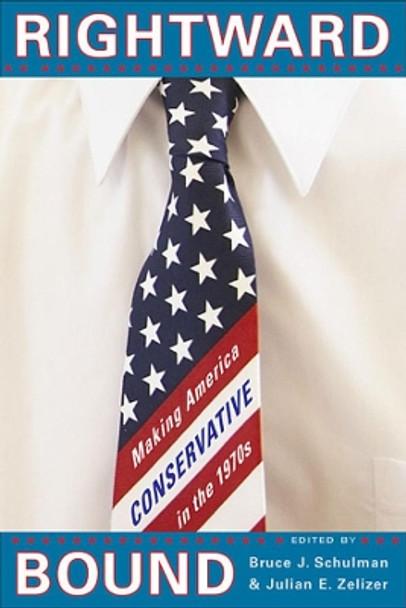Description
Often considered a lost decade, a pause between the liberal Sixties and Reagan's Eighties, the 1970s were indeed a watershed era when the forces of a conservative counter-revolution cohered. These years marked a significant moral and cultural turning point in which the conservative movement became the motive force driving politics for the ensuing three decades.
Interpreting the movement as more than a backlash against the rampant liberalization of American culture, racial conflict, the Vietnam War, and Watergate, these provocative and innovative essays look below the surface, discovering the tectonic shifts that paved the way for Reagan's America. They reveal strains at the heart of the liberal coalition, resulting from struggles over jobs, taxes, and neighborhood reconstruction, while also investigating how the deindustrialization of northern cities, the rise of the suburbs, and the migration of people and capital to the Sunbelt helped conservatism gain momentum in the twentieth century. They demonstrate how the forces of the right coalesced in the 1970s and became, through the efforts of grassroots activists and political elites, a movement to reshape American values and policies.
A penetrating and provocative portrait of a critical decade in American history, Rightward Bound illuminates the seeds of both the successes and the failures of the conservative revolution. It helps us understand how, despite conservatism's rise, persistent tensions remain today between its political power and the achievements of twentieth-century liberalism.
Rightward Bound brilliantly demonstrates how American conservatism emerged as a full-blown movement in the 1970s and, in the process, created the United States of the twenty-first century. It is a wonderful book! -- Laura Kalman, University of California, Santa Barbara A new generation of American historians demonstrates that the decade of the 1970s proved the crucial seed time for the rise of modern American conservatism. There was nothing inevitable about the nation's march to the right, which makes this book all the more fascinating and necessary for those who want to understand twenty-first century America. -- Nelson Lichtenstein, author of Wal-Mart: The Face of Twenty-First-Century America Rightward Bound is the most comprehensive and incisive history to date of the conservative mobilization that surged through and transformed the United States in the 1970s. It will prove essential reading for anyone seeking to understand conservative ideologies, institutions, and organizing strategies as well as the complexities of politics and culture in late twentieth-century America. -- Gary Gerstle, Vanderbilt University
About the Author
Bruce J. Schulman is William E. Huntington Professor of History at Boston University. Julian E. Zelizer is Malcolm Stevenson Forbes, Class of 1941 Professor of History and Public Affairs at Princeton University.
Reviews
Rightward Bound brilliantly demonstrates how American conservatism emerged as a full-blown movement in the 1970s and, in the process, created the United States of the twenty-first century. It is a wonderful book! -- Laura Kalman, University of California, Santa Barbara
A new generation of American historians demonstrates that the decade of the 1970s proved the crucial seed time for the rise of modern American conservatism. There was nothing inevitable about the nation's march to the right, which makes this book all the more fascinating and necessary for those who want to understand twenty-first century America. -- Nelson Lichtenstein, author of Wal-Mart: The Face of Twenty-First-Century America
Rightward Bound is the most comprehensive and incisive history to date of the conservative mobilization that surged through and transformed the United States in the 1970s. It will prove essential reading for anyone seeking to understand conservative ideologies, institutions, and organizing strategies as well as the complexities of politics and culture in late twentieth-century America. -- Gary Gerstle, Vanderbilt University
Rightward Bound arrives at a prescient moment. Modern American conservatism is far from its political death, but the ruinous legacy of George W. Bush has helped dash Karl Rove's dreams of a permanent majority. Culturally, the story is similar. Annual abortion numbers have remained steady, public acceptance of gay rights continues to increase, and immigration has failed as a Republican wedge issue. So what are the reasons for this mixed record? As co-editors Bruce J. Schulman and Julian E. Zelizer argue, the movement's past has much to say about the contemporary condition....It is a highly important and useful study, and one that offers scholars a new way of grasping conservatism. Just as importantly, this is a book that will hopefully be valuable to a broader general audience. If the public is to make sense of why the conservative revolution faces an uncertain future, they must look backwards as well, and appreciate its laborious beginning. -- Christopher Martin * popmatters.com *
An uncommonly coherent collection of innovative essays. -- Corey Robin * The Nation *
One of the great virtues of Rightward Bound: Making America Conservative in the 1970s, the helpful collection of essays edited by Bruce J. Schulman and Julian E. Zelizer, is that it gathers in one place many of the best young left-of-center historians working on the rise of the right. Conservatives will take issue with many of the book's conclusions; they cannot say any longer, as they once could, that the liberal academy doesn't take conservatism seriously. -- E. J. Dionne * American Prospect *
Awards
Nominated for Leon Epstein Outstanding Book Award 2009.
Book Information
ISBN 9780674027589
Author Bruce J. Schulman
Format Paperback
Page Count 384
Imprint Harvard University Press
Publisher Harvard University Press






